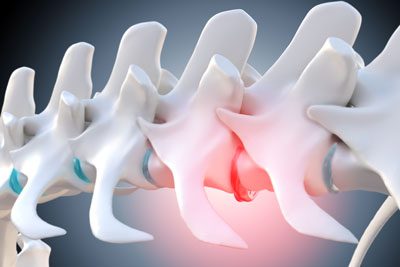Collapsed Disc
A Form of Disc Deterioration

A collapsed disc is a spinal disc that has lost its normal height due to deterioration of its fibrous outer wall. While this degeneration can be related to traumatic injury, it is more frequently a result of wear due to the natural aging process. Diminished disc height is most common within the cervical (upper) and lumbar (lower) regions of the spine, where the vertebrae bear significant body weight and are subjected to a wide range of stress-inducing motion. This condition does not necessarily produce symptoms, but if reduced disc height leads to compression of a nerve root or the spinal cord, pain, tingling, numbness or muscle weakness can occur.
While disc degeneration is irreversible, resulting symptoms can often be treated successfully using pain medication, epidural steroid injections, exercise and other nonsurgical methods. However, if chronic pain or other nerve compression symptoms persist after several weeks of conservative treatment and surgery does become an option, contact SpineOne for a same-day appointment. This injection uses advanced imaging to deliver anesthetic and/or steroid medication directly into the collapsed disc, reducing inflammation and related pain. This procedure is minimally invasive and outpatient. Most SpineOne patients who receive treatment for this condition report experiencing diminished pain and improved quality of life.
See a Doctor About a Collapsed Disc
This pain comes from one of your spinal discs. Those are the soft cushions that allow the bones of your spine to flex and twist. A collapsed disc is a common reason for chronic lower back pain. SpineOne specializes in diagnosis and effective treatment of this condition.